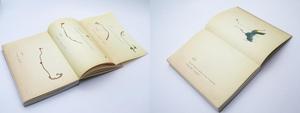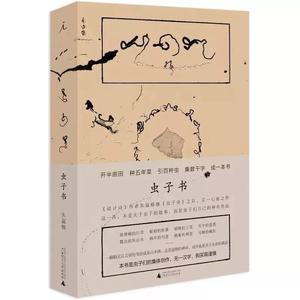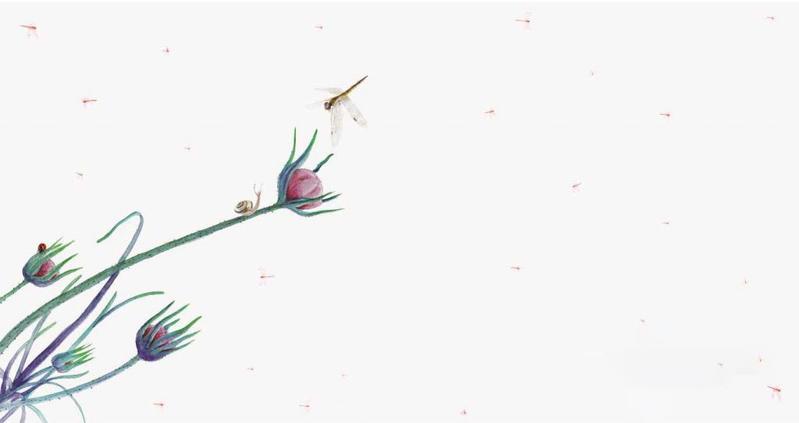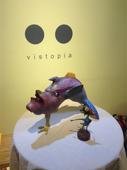Tiny creatures allow academic to spotlight a fascinating subject and also give children a unique insight into the wonders of nature, Mei Jia reports.
 A page from Cacaform Birds by Zhu (left); A page from Images of Cacaform Birds. (PHOTO PROVIDED TO CHINA DAILY)
A page from Cacaform Birds by Zhu (left); A page from Images of Cacaform Birds. (PHOTO PROVIDED TO CHINA DAILY)
For book designer, author and artist Zhu Yingchun, bugs are not electronic listening devices but they do provide a method to eavesdrop on Mother Nature.
"We should listen to and observe bugs, make more contact with them, like with our friends, and wait for nature's message from them," says Zhu about his "old pals" in a lecture livestreamed by Bilibili.com and the Artron Art Group on May 23.
The tales of his "valuable friends" charmed an appreciative audience. Bugs helped ensure he won the silver medal in 2017 for the Most Beautiful Book in the World category at the Leipzig Book Fair for his book, The Language of Bugs.
We should listen to and observe bugs, make more contact with them, like with our friends, and wait for nature’s message from them
Zhu Yingchun, author, book designer and artist
The book is actually a printed record of thousands of tiny trails, made over the course of five years, by 100 bug species that populate the garden outside his studio at Nanjing Normal University, where he is director of the university's Research Center of Book Culture. Zhu designed the book "seriously and academically" with a preface, introduction, table of contents, captions, and all the other elements of a tome-it's just that all of the characters and words inside were written by the bugs.
It was published by Beijing Imaginist Time Culture and Guangxi Normal University Press in 2015 and in English by UK's ACC Art Books in 2018.
"This work is a forerunner in the field of morphology," the awarding committee commented on his book. "This artistic study succeeds in... realization of a philosophical metaphor: the world as a book that writes itself."
Another tale highlights his innovative approach. He designed a cinema "about bugs and for bugs" as part of a public art project held in Nanjing, Jiangsu province, this spring. The man-made ant hill hosts a mini screen showing a short film about insects. It plays to an audience of bugs, while giant humans have to peep in from outside if they want to watch.
There's more. Last year he opened a bug-themed bookstore and display space by the picturesque Xuanwu Lake that he designed in collaboration with the Librairie Avant-Garde Bookshop. Additionally, a museum with a focus on bugs is expected to be set up in Nanjing.
 The cover of The Language of Bugs by Zhu. (PHOTO PROVIDED TO CHINA DAILY)
The cover of The Language of Bugs by Zhu. (PHOTO PROVIDED TO CHINA DAILY)
Cicada starts the tale
One day, as a "spot clothing wax cicada" strolled across his sketchbook, leaving a trail, he suddenly felt the urge to capture the moment. He created "ink ponds" made of four kinds of dark-colored vegetable juice and watched the bugs crawl through them, then "draw" their journey on blank sheets of paper. In this way, all kinds of crawling creatures-earthworms, ladybugs, spiders, mantises, stink bugs, ants and snails-became painters.
He put their calligraphic creations and ink-wash paintings, together, in the book. "Everything in the world, including every life in nature, has the power to create beauty, and art is all around us," Zhu says. "I had a lot of fun in those five years, more than designing books for human authors."
The book has become a permanent collection of the British Library. Zhu also made woodcut blocks copying some of the characters created by the bugs and has displayed them in various exhibitions, attracting much appreciation from visitors.
The English version has a booklet entitled The Birth of the Language of Bugs, in which the editor says: "Zhu's creations express his inquisitive approach to the world and his belief that every part of nature has a distinctive beauty." There is also a QR code to access more information.
Born to a farming family in Huaian, Jiangsu province, in 1970, nature and drawing provided an escape from his lonely childhood. Before receiving his first set of paints in his teenage years, he made colors himself with anything he could find. "My childhood dream was to become an art teacher and to keep on drawing bugs," he says. "I was always alone, wondering and tasting the beauty of nature."
 A painting of plants and small creatures by Zhu Yingchun. (PHOTO PROVIDED TO CHINA DAILY)
A painting of plants and small creatures by Zhu Yingchun. (PHOTO PROVIDED TO CHINA DAILY)
He enrolled in the Nanjing Normal University of fine arts in 1991 and after graduation became an art editor at the university press. The campus where he has been living since college is part of Suiyuan, the Qing Dynasty garden built by poet, critic and gourmet Yuan Mei.
The artist's work has won numerous "most beautiful books" prizes in China, as well as international honor and acclaim, including from UNESCO. His most famous work comprises the design of the books Stitched Up, Pingru and Meitang: Our Stories, The Designing Wordsmith and Pork Fat. He also wrote, created and designed a series of publications about his "old pals", such as Next to Bugs, Ants Talk, The Slowpoke Snail and Bugs' Notebook, many of which have been translated into English, Korean, Norwegian and Czech. A new book, themed on bugs' poetry, will be released later this year.
The books are playful and fun to read, combining visual art, painting, literature and graphic design, and "some of them have explored and expanded the range and concept of books, unrolling the rich prospect of book design," says Xu Xiaoding, secretary-general of the International Artist Books Association, which was founded in Beijing in 2019.
Kang Pingping, with the German Book Information Center in Beijing, a branch under the Frankfurt Book Fair, says Zhu is an old friend of the fair and a popular speaker at its Storydrive Asia conference. "Zhu is childlike and creative, always bringing something new to us," Kang says. "He's charming and attractive to many of us and his fans, as he truly loves what he does and pursues."
 Some art pieces made by Zhu of the strange-looking characters depicted in the book. (PHOTO PROVIDED TO CHINA DAILY)
Some art pieces made by Zhu of the strange-looking characters depicted in the book. (PHOTO PROVIDED TO CHINA DAILY)
Inspiration from above
Although his book series about bugs has drawn many young readers, his latest book about birds may have triggered some controversy among their parents, perhaps, due to the origin of its subject matter.
Following the release of the Chinese version in 2017, the English version of Cacaform Birds was published in 2019, comprising three parts entitled Images, Catalogue and Secrets Unveiled. It is about alien birds visiting Earth, which then get scared and later transformed, only to be saved by the energy of curiosity.
Among the many strange-looking birds, there is one called Glowerspite, which dozes in a supine position and converts its tail to a head when it gets startled, and there is another called Mare-away, a bird which carries a tiny dark troll on its back that rouses dreamers from nightmares.
The inspiration for the book actually came years ago, when bird droppings landed on Zhu's coat as he was setting off for Shanghai to attend a Monet exhibition. He had to abandon his trip to clean his coat.
"I soon decided to shake off any upset, because it just brings more anger, instead persuading myself to take it as nature's gift," Zhu says.
And indeed it was-he examined the stain and found it almost formed the shape of a bird. He soon became keenly interested in it, and other bird droppings, which he copied into his sketchbooks over the next three years, before turning them into a book.
"I'm delighted to create something out of nothing, or the positive out of the unpleasant," says the world-class artist and author, who aims at creating his own titles and telling stories in the language of nature, to inspire, entertain and educate.
Zhu enjoys talking to, and drawing with, children to ignite their creativity in schools, and maybe due to a similar power of curiosity, younger readers can quickly understand Zhu's ideas. They're also encouraged by Zhu to discover and depict their own transformed birds.
He always wants to do something to influence more people to find valuable things in life.
Chinese art lessons are about being pleasant and realistic, he says, but things that are vulgar or simple can also be beautiful.
"Beauty is about being interesting and vigorous, no matter if it initially seems ugly or plain. The meaning lies in how the creator deals with the subject," he says.
Contact the writer at meijia@chinadaily.com.cn


